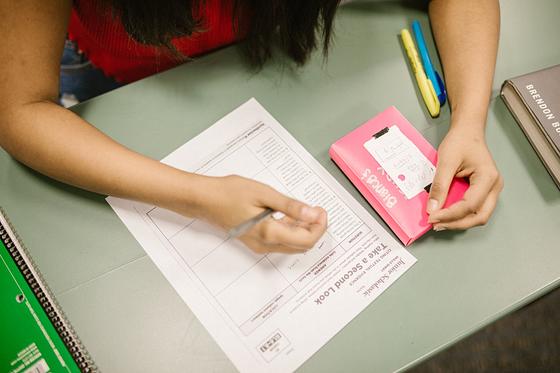I know! I know! It's summertime, and everyone just wants to relax and enjoy their pool parties.
However, like it or not, college application season is approaching. And if you're reading this any other time, good job for either getting ahead of the curve! Or… college application season is here, and you're looking for advice on approaching the situation. Don't worry! This article is going to give you a basic timeline for when you need to start preparing for every step of the college application process.

via Pexels
Let us slide into your dms 🥰
Get notified of top trending articles like this one every week! (we won't spam you)September - April of Junior Year
Right now, it's pretty early in the game, and you have plenty of time before you start actually applying to colleges. The best thing you can do is prepare for any AP courses you might be taking and choose a date for the SAT. It's always better to start studying for the SAT early on so you have the flexibility of multiple dates and can take it multiple times if you don't get the score you want.
It is highly recommended that you schedule meetings with your high school/college counselor to ensure you are on track academically and fulfilling all necessary requirements. Additionally, it is advisable to begin formulating a list of individuals you would like to approach for letters of recommendation. Consider reflecting on a passion project or activity that you intend to pursue during the summer, such as an internship, online class, or volunteer opportunity. This thoughtful preparation will contribute to a well-rounded application and enhance your chances of success.

via Pexels
Take the Quiz: What Type of Notes Should I Take?
Discover the best note-taking method for your learning style!
May - June of Junior Year
Just because it's 80 degrees out doesn't mean you can rest yet! Complete your AP tests and maintain your SAT study routine if you're aiming for an improved score; ensure you register for upcoming test dates accordingly. If you haven't already, seize the opportunity to embark on college tours and solidify your preferences for prospective schools.
Now you should set up your common application and coalition application account and have your basic information filled out. Afterward, begin requesting letters of recommendation from your teachers or other recommenders. Here are some valuable tips to consider when writing your letters of recommendation:
Choose the Right Recommender: Select someone who knows you well and can speak to your abilities, character, and achievements. Ideally, choose someone in a position of authority or who has firsthand experience working closely with you.
Personalize Your Request: When asking for a letter of recommendation, remind the recommender of your shared experiences, accomplishments, or specific projects you worked on together. This personalized touch can help them recall and highlight your strengths more effectively.
Share Relevant Information: Provide your recommender with a current resume or summary of your accomplishments, along with any specific guidelines or requirements for the recommendation letter. Include information about the program, job, or scholarship you are applying to so they can tailor their letter accordingly.
Be Clear and Specific: Clearly articulate the purpose of the recommendation letter, specifying what aspects of your skills, character, or achievements you would like them to highlight. The more specific and targeted your request, the more effective and impactful the letter will be. Follow Up and Express Gratitude: After your recommender has submitted the letter, express your gratitude with a heartfelt thank-you note. Let them know how much you appreciate their support and the time they invested in writing the letter on your behalf.
Keep Recommenders Updated: If you receive positive outcomes, such as admission to a program or securing a job, keep your recommenders informed. They will appreciate hearing about your success, and it can strengthen your professional relationships.

via Pexels
July - August, between Junior and Senior Year
Initiate the brainstorming process for your common application essay and begin drafting one or two rough versions to refine your ideas. At this stage, you should have finalized your list of schools to which you plan to apply. Utilize your available free time to continue visiting college campuses and gathering insights while simultaneously working on drafting your common application activities section.
Consider the October or December test dates if you intend to take the final SAT test and still aspire for improvement. Alternatively, you may opt for a test-optional approach and concentrate on honing the other components of your application. Commence the initial draft of your supplemental essays for each school, allowing ample time for revision and enhancement. Think about any potential scholarships like the Questbridge program, Coca-Cola scholarship, or the Jack Kent Cooke Scholarship that you would like to apply to in the fall and start applying for them towards the end of the summer.

via Wikipedia
September of Senior Year
Ah, Senior year! The time for spirit week, your last homecoming, and last well.. everything! But stay focused!
You still have a long way to go before you can call it quits. Check in with your recommenders to ensure they're on track with your letters. Finalize your common app essay while you don't have as much work in the first month of school (trust me! It gets hectic!). If you're satisfied with your SAT/ACT score already, look into sending them to the colleges of your choice (and by now, your college list should definitely be finalized).

via Pexels
October - December of Senior Year
Even though the holiday mask of Halloween and Christmas is here, you still need to finish up your common app essay and finalize your supplements once and for all. Check in with your recommender one last time to ensure they have your letter in by now (Don't be afraid to remind them of the deadline). Suppose you opt for early decision or early action applications.
In that case, submitting them in November and your UC applications, if applicable, is advisable. By December, you can anticipate receiving the outcomes for your early decision or early action applications. If you were accepted into your top choice from the jump, congratulations!! Then these next few months will be a little bit different for you since you have already chosen the college you want to attend for the next 4 years. If you didn't get in, that's okay! If you haven't finished your regular decision supplements, you should get on that ASAP!

via Pexels
January - March of Senior Year
You don't really have much to do here (except deal with the seasonal depression). Ensure you fulfill any interview requirements if offered the opportunity, as they can provide valuable insights into your candidacy. Also, initiate applying to local or external scholarships to expand your financial aid options and maximize opportunities for funding your education. If you got into your top choice ED (Early Decision), consider attending any events and getting to know your future classmates.

via Pexels
March - April of Senior Year
Spring has sprung, and you're finally approaching the end! But don't let senioritis take hold of you yet! Let the regular decisions roll, and start considering your options.
Attend admitted students weekend and see which school best fits you. In the event that you find yourself on a waitlist, it is recommended to compose a letter expressing your continued interest in the school. Craft a compelling letter emphasizing your genuine enthusiasm for the institution and provide any relevant updates or achievements since submitting your initial application. Proactively communicating your dedication and eagerness may enhance your chances of moving off the waitlist and securing admission. But keep your options open and consider a backup school in the worst-case scenario that you don't get off. ED students should continue celebrating their friends' acceptance, especially if they get into the same school as you! Lastly, finalize which school you would like to matriculate to.

via Pexels
May - June of Senior Year
After a long hellish year filled with ups and down, you're finally at the finish line! You should submit your enrollment deposits by May 1. Start filling out your housing application, making your schedule, and saying your final goodbyes to your high school.
If you receive an acceptance from the same school as a classmate or friend, embrace the opportunity to connect with them. Reach out and converse with other individuals who have also been accepted. Consider attending orientation events and activities where you can interact with fellow incoming students. This is an underrated last tip but thank your recommenders! Letters of Recommendations are very important in the eyes of admissions officers, and without their support, your application could have been on the teetering edge between an acceptance or a rejection. If you didn't get to the school of your choice or didn't get off the waitlist, try falling in love with the school, you're already at. Use this timeline as a rough guide to work on your transfer applications. Either way, be glad that no matter what happens, you worked hard and have a chance to relax now!

via Pexels
Hopefully, this timeline has helped you figure out where you should be in terms of progress when it comes to applying. As a former senior myself, I know college applications can be stressful and time-consuming. But if you haven't heard from anyone else, let me say that I'm proud of you all for taking your first step to complete one of the biggest moments of your life (and a good chunk of your senior year)!
Even though it may seem awful now, you'll look back at this moment and potentially be great that it got you to where you want to be. If not, that's okay too! You'll still look back and learn from those experiences that will make you even stronger in the future! This may seem cliche, but if you can avoid it, never wait until the last minute for your essays (take it from me 😅). College applications are a marathon, not a sprint. You need to pace yourself and break it down the best way so your application can be the highest quality it's ever been.
If you're interested in a fully comprehensive guide to approaching the college application process and need some in-depth advice, check out these articles: College Applications: How to Manage the Stress, 5 Things to Keep in Mind While Crafting Your Common App Essay, and Interview Mastery: Achieving College Admissions Success with These Proven Strategies. Good Luck, Seniors!

















